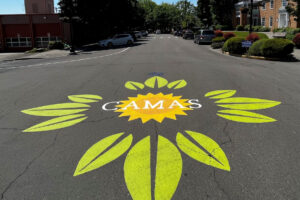According to a consultant’s report delivered to Camas and Washougal city council members this month, in order to meet the needs of current and future Camas and Washougal residents, the cities’ joint fire department will need to replace two fire stations and build a third within the next 10 years.
“We projected out to 50 years from now to meet the needs of Camas and Washougal,” Cathy Bowman, the project manager for Mackenzie, the consultant group hired by Camas in early 2021 to conduct a capital facilities plan for the Camas-Washougal Fire Department (CWFD) told Camas City Council members on Oct. 4.
The report lines up with another consultant evaluation in 2019, which examined the fire department’s response times and said CWFD would likely need to relocate the downtown Camas Station 41 as well as the Washougal-based Station 43 and build a new station to respond to fires and emergency medical calls within the 4-minute (for initial response) and 8-minute (for a full response) standards set by the National Fire Protection Association and the Center for Public Safety Excellence.
The 2021 Mackenzie report presented to Camas and Washougal city councils this month recommends:
- Replacing the downtown Camas-based CWFD headquarters — which consultants warned does not currently meet the guidelines for “an essential facility” and would not withstand a major earthquake — in the next two to three years;
- Replacing the Washougal fire station in the next five to seven years; and
- Building a third fire station in Camas within the next 10 years.
Excluding any necessary land purchases, the consultants projected the total cost of replacing the two existing CWFD fire stations and building a third station would be between $33 million and $36.5 million. After accounting for the cities’ fire impact fees, local officials would still face a funding gap of between $27.5 million and $30.8 million, the consultants’ report showed.
City leaders will likely consider a mix of tools to help fund the necessary fire department facility needs, including increasing fire impact fees; asking voters to approve construction bonds, a public-safety sales tax and/or an excess levy; and selling surplus land.



